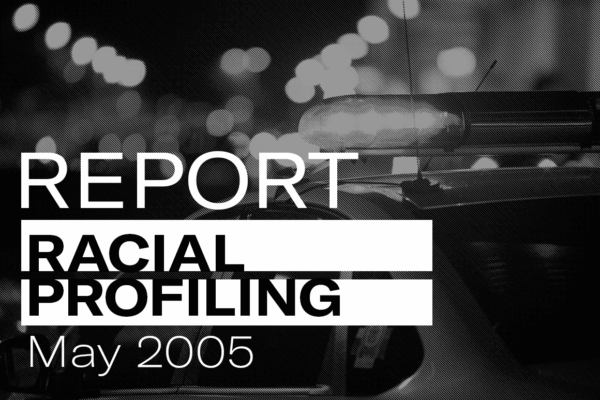In a 42 page report released today, the ACLU of Rhode Island charged that many police departments are failing to comply with provisions of the strict law against racial profiling passed last year by the General Assembly.
In March, Northeastern University issued a preliminary report on its examination of traffic stops statistic data for the state for the months of October-December 2004. The report was the first follow-up to a similar, comprehensive study of two years’ of traffic stop data collected and analyzed by Northeastern for 2001-2002. The major findings of this most recent report echoed those of the earlier study: minority drivers were more than twice as likely as whites to be searched by police, but white drivers were still more likely than racial minorities to be found with contraband when searched. The report also indicated that about 10% of the traffic stop forms submitted to Northeastern were missing necessary data.
The R.I. ACLU examined in more detail the Northeastern report, the error rate data referenced in the report, and written progress reports submitted by police departments in response to the 2001-2002 findings of widespread racial disparities in traffic stops and searches. Among the ACLU’s major findings:
- Of the ten police departments that conducted the most stops and/or searches in the latest study, four showed an increase over 2001-2002 in the proportion of searches conducted on minority drivers compared to white drivers.
- Police department supervisory personnel are generally failing to comply with a statutory obligation to review traffic stop cards to ensure that they are being filled out completely by officers. They also appear to be ignoring a statutory obligation to review traffic stop information on a regular basis in an effort to respond to any racial disparities highlighted by data.
- The error rate in filling out traffic stop cards has been increasing, not decreasing, over time.
- Some of the most vital pieces of data being collected on the traffic stop cards – concerning searches and location of stops – have among the highest error rates.
- The Providence Police Department’s compliance with the law, as was also true with its data collection in the 2001-2002 study, is exceedingly poor.
- Among the recommendations made in the report to address these serious deficiencies:
- Every law enforcement agency should be required to formally certify each month that supervisory personnel have checked the traffic stop forms for both accuracy and completeness on at least a weekly basis, as required by law, and to list the officials responsible for this review.
- Every law enforcement agency should be required to formally submit, on a monthly basis, a brief report confirming that the cards have been reviewed for disparities, and indicating whether that review has found any patterns relating to officers, locations or practices that may be responsible for the disparity.
- Police officers should be required to document in writing their “probable cause” or “reasonable suspicion” grounds for conducting a search, and so-called “pretext” stops by police should be banned.
RI ACLU executive director Steven Brown said today: “We are hopeful that this report will prod police departments across the state to be much more proactive and vigilant in addressing the critical problem of racial profiling in our state. Implementation of the modest recommendations we have proposed would serve two important goals: ensuring that the current study provides accurate and meaningful data, and giving police chiefs the information they need to address any racial disparities in traffic enforcement that are documented by the data.”

